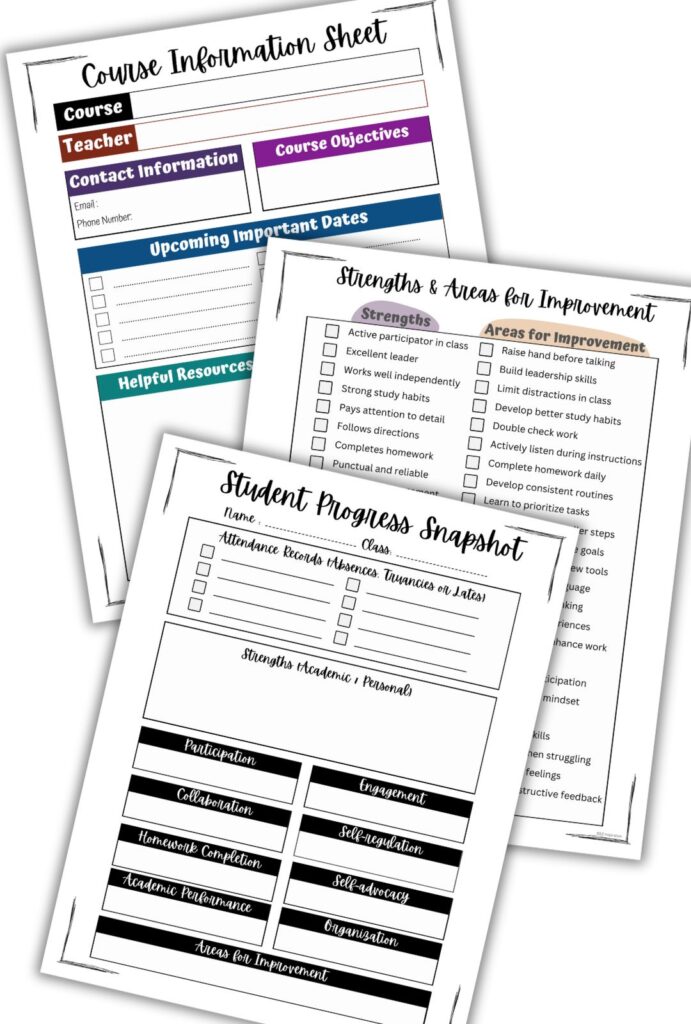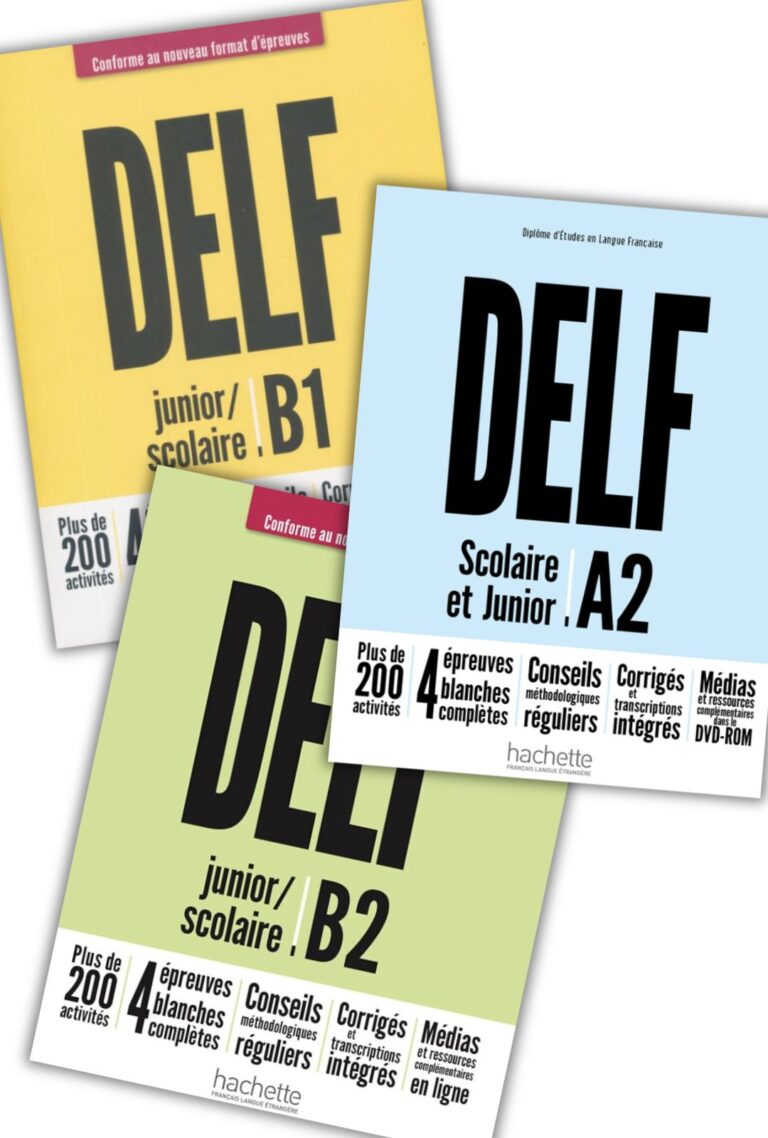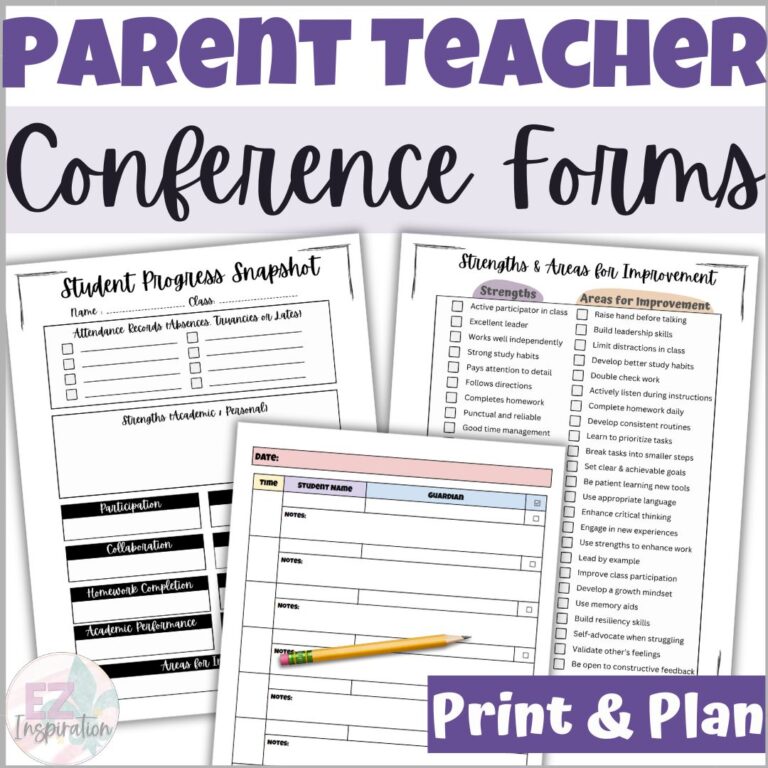
As teachers, we understand the importance of fostering strong student engagement and creating meaningful relationships with parents. Parent-teacher interviews provide a wonderful opportunity to connect with our students’ guardians, share valuable insights about student progress, address any concerns, and build partnerships that support student success.
In this blog post, I’ll share actionable tips and strategies for French teachers to approach parent-teacher interviews with confidence, creativity, and clarity. By following these tips, you can make these conversations impactful, productive, and ultimately beneficial for your students’ academic journey.
1. Prepare With Purpose: Know Your Students WELL
Before the interview, take the time to thoroughly review your student’s progress, behavior, and engagement levels in French. I call this the “student progress snapshot.” For French teachers, this could mean looking at:
- Language Proficiency: How well are their speaking, writing, listening, and reading skills? How well is the student grasping grammatical concepts?
- Homework and Assignment Completion: Are they regularly completing tasks? Are there any outstanding tasks they haven’t completed? Are they completing their work to the best of their ability?
- Classroom Behavior and Participation: do they participate in French conversations or small group discussions? Are they engaged in classroom activities? Are they being a role model for other students in class
- Areas for Improvement: Identify specific challenges they are facing, such as difficulties with modeling pronunciation, lack of vocabulary, or understanding verb conjugations.

Reflecting upon this information ahead of time with anecdotal evidence and sharing this insight at the parent-teacher interview will help parents understand that you are invested in their child’s education and will give them a clear picture of their child’s progress in French.
2. Start The Parent-Teacher Interview With Positive Affirmation
Many parents are often anxious regarding their child’s progress in school. Since many of them do not speak French, they often feel that they cannot help their child at home and may be worried with how they are adjusting to this challenge.
Therefore, it is important during the parent-teacher interview to set a positive tone right away at the beginning by highlighting their effort or achievements. You can highlight the students’ strengths, whether it’s their enthusiasm for French culture, progress in vocabulary acquisition, or consistent improvement in their speaking skills.
If you’ve noticed a particular accomplishment, like a student mastering a tricky grammar concept or showing improvement in speaking fluency, it is important to share that success. These conversations help build trust with parents and reassure them that their child is on the right track.
3. Use Clear, Student-Centered Language

While discussing students’ progress, strengths, or challenges, it is important to avoid complex terminology. Not every parent may be familiar with terms like “subjunctive”, “passé composé,” “growth mindset,” or “les critères d’évaluation.” Instead, use plain language and examples that parents can relate to, explaining what the student is doing well or struggling with.
For example, if you want to highlight that Sophie has difficulty with irregular verb conjugations, you could say, “Sophie is still working on mastering some of the more complex verb forms, like ”Être” and “Avoir” which are fundamental for forming complete sentences. This plain language makes your feedback more accessible and actionable for parents.
4. Be Solution-Oriented By Offering Actionable Steps
While it’s important to discuss areas where a student may need support, it’s equally as important to focus on the solutions to these challenges. You will want to emphasize strategies or resources that parents can use at home to support their child’s progress in French.
For instance, suggest incorporating French into their daily routines, such as labeling household items with French vocabulary or dedicating a “French-only” time for short periods throughout the day when the family practices speaking together. Parents can also designate certain homework periods every day at home, where their child can review their French notes, complete their homework, or participate in enrichment opportunities.
By equipping parents with practical tools and ideas, they can actively contribute to their child’s success while reinforcing the skills learned in class.
5. Showcase the Value of Learning French
Some parents may wonder about the importance of French, especially in an anglophone-dominated society. It is important to share the advantages of continuing with French and how bilingualism boosts cognitive skills, enhances career opportunities, and fosters cultural awareness.
One of the selling features for many of my French students is the opportunity for them to take the DELF exam in grade 12. This is an internationally recognized bilingual certification that validates their French language skills and opens doors to numerous opportunities. Whether they are applying to universities, seeking scholarships, or looking to enhance their resumes, the DELF certification serves as tangible proof of their French proficiency.

6. Invite Questions and Feedback
During parent-teacher interviews, it is also important to encourage parents to share their thoughts or concerns. This open communication helps create a collaborative atmosphere where everyone feels valued and heard.
This is also an opportunity for you to learn about the student’s unique needs, family dynamics, or other relevant factors, which can provide valuable insight into how to adapt your teaching strategies to support their success. Demonstrating a willingness to listen and act on parents’ input will help build trust and reinforce the idea that parents and teachers are partners in the child’s educational journey.
7. Provide Resources for Home Support
As an actionable step, it is equally important to share specific tools that can help students practice their French outside the classroom. For example, teachers can recommend certain language learning apps, shows, books, or websites to improve their French vocabulary, grammar, or skills.
If you are looking for a French support guide to share with your students, check out this resource that highlights a variety of excellent tools to support Intermediate and Senior French students on their French language journey.
8. End on a Positive Note
At the end of the parent-teacher interview, you will want to close the meeting by reiterating the student’s strengths and expressing confidence in their ability to succeed. Thank the parents for their time, support, and partnership, emphasizing that their involvement plays a crucial role in their child’s success.
Conclusion
In closing, parent-teacher interviews are an important opportunity to strengthen the partnership between educators and families. These meetings allow for meaningful conversations about student progress but also create a platform for sharing insights, addressing concerns, and working together to ensure every child succeeds. By fostering open communication, we can build trust, provide valuable support, and ultimately contribute to a positive educational experience for our students.
P.S: If you want to shine during your parent-teacher interview, don’t miss out on this thorough resource that will give you practical tips and a variety of handouts to help you succeed


